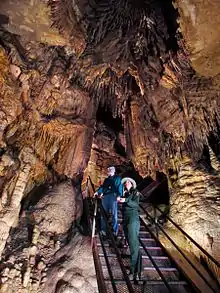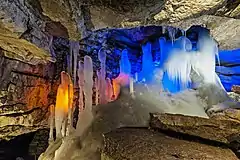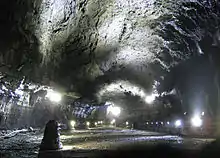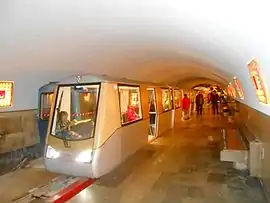Show cave
A show cave — also called tourist cave, public cave, and in the United States, commercial cave — is a cave which has been made accessible to the public for guided visits.

Definition
_-_China-7516.jpg.webp)


.jpg.webp)

.jpg.webp)
_(18790990808).jpg.webp)
A show cave is a cave that has been made accessible to the public for guided visits,[1] where a cave is defined as a natural occurring void beneath the surface of the earth, per the International Show Caves Association.[2]
A show cave may be managed by a government or commercial organization and made accessible to the general public, usually for an entrance fee. Unlike wild caves, they may possess regular opening hours, guided group tours, constructed trails and stairs, color artificial illumination and other lighting,[3] musical/video/laser shows and concerts, elevators, small trains, and boats if they contain underground water features. Some caves (mainly in Asia) open to the public have temples, monasteries and religious statues or monuments. Some caves are visited by millions of tourists annually.
The term is used inconsistently between nations: many countries tend to call all caves which are open to the public show caves. However, there are many caves which are not developed with trails, light and tours, which are visited by very many people. This kind of cave is often called a semi-wild cave. Access may involve anything between an easy stroll and dangerous climbing. Most cave accidents happen in this kind of cave, as visitors underestimate the difficulties and dangers.
History



The oldest known show cave in the world is probably Reed Flute Cave in China with inscriptions from 792 in the time of the T'ang Dynasty. Other old show caves are Postojna Cave in Slovenia, with the presumed first record of a cave tour in 1213. Other early show caves are Jasovská jaskyňa in Slovakia with inscriptions from 1452, the Sontheimer Höhle in Germany which was reportedly visited by Herzog Ulrich von Württemberg on 20 May 1516 and Vilenica Cave in Slovenia where entrance fees were taken from 1633 on. In 1649, the first "authorized" cave guide started guiding Baumannshöhle in the Harz in Germany though this cave was intensively visited much earlier.
The development of electric lighting enabled the illumination of show caves. Early experiments with electric light in caves were carried out by Lieutenant Edward Cracknel in 1880 at Chifley Cave, Jenolan Caves, Australia. In 1881, Sloupsko-Šošůvské Jeskyně, Czech Republic, became the first cave in the world with electric arc light. This light did not use light bulbs, but electric arc lamps with carbon electrodes, which burned down and had to be replaced after some time.
The first cave in the world with electric light bulbs as we know them today was the Kraushöhle in Austria in 1883. But the light was abandoned after only seven years and the cave is today visited with carbide lamps. In 1884, two more caves were equipped with electric light, Postojna Cave, Slovenia, and Olgahöhle, Germany.
Because of the unwanted development of lampenflora (algae attracted to heat and light) around incandescent electric lights in show caves, many of these attractions, such as Ingleborough Cave in England, have switched to cooler-temperature LED lighting.[4]
Notable show caves (in alphabetical order)
- Caves of Aggtelek Karst and Slovak Karst[5] Hungary/Slovakia
- Ajanta Caves,[5] Aurangabad, Maharashtra, India (with monastery and monuments)
- Akiyoshidai Cave, Yamaguchi, Japan
- Alisadr Cave, Alisadr, Hamedan, Iran (largest water cave)
- Angitis, near Prosotsani, Greece (longest underground river cave)
- Atta Cave, Attendorn, Germany
- Aven d'Orgnac, Orgnac-l'Aven, France
- Avshalom Cave (Absalom Cave, Soreq Cave), Israel
- Bacho Kiro cave Cave, near Dryanovo, Bulgaria (the first show cave in Bulgaria inaugurated in 1937)
- Batu Caves, near Kuala Lumpur, Malaysia
- Bears' Cave, Chişcău village, Bihor County, Romania
- Cuevas de Bellamar, Matanzas, Cuba
- Bing Cave in Bavaria, Germany
- Blanchard Springs Caverns in Arkansas, United States
- Blanche Cave, Naracoorte, South Australia, Australia
- Blue Grotto sea cave, in Biševo island, Dalmatia, Croatia
- Buchan Caves, Victoria, Australia
- Grottes de Calès, near Lamanon, France
- Cango Caves, Oudtshoorn, South Africa
- Capricorn Caves, Rockhampton, Queensland, Australia
- Castellana Caves,[5] near Bari, Italy
- Carlsbad Caverns[5] in New Mexico, United States
- Cascade Caverns, Boerne, Texas, United States
- Cathedral Caves, South Island, New Zealand
- Cave Without a Name, near Boerne, Texas, United States
- Craighead Caverns in Tennessee, United States
- Cross Cave, Slovenia
- Crystal Cave (Ohio) in Put-In-Bay, Ohio, United States (The world's largest known geode, a celestine geode 35 feet (11 m) in diameter at its widest point)
- Dambulla cave temple,[5] Sri Lanka
- Dan yr Ogof in Powys, Wales
- Dechen Cave, Iserlohn, Germany
- Deer Cave, near Miri, Sarawak, Malaysia
- Dirou Pyrgos Caves (Glyfada Cave and Alepotrypa cave) with underground river, Pyrgos Dirou, Greece
- Devil's Throat Cave, Western Rhodope Mountains, near Gyovren, Bulgaria
- Dobšiná Ice Cave, Slovakia
- Doolin Cave (Pol an Ionain) in Doolin, Ireland
- Cuevas del Drach (Dragon Caves) on Majorca Balearic island, Spain (with concerts)
- Dupnisa Cave, Kırklareli, Turkey
- Eisriesenwelt, near Salzburg, Austria
- Elephanta Caves,[5] near Mumbai, Maharashtra, India (with monuments)
- Ellora Caves,[5] Aurangabad, Maharashtra, India (with monastery and monuments)
- Erdmanns Cave near Lörrach, Germany
- Fantastic Caverns near Springfield, Missouri
- Frasassi Caves, Ancona, Italy
- Grotta Gigante, Trieste, Italy
- Grutas de Cacahuamilpa, Guerrero, Mexico
- Gunns Plains Cave in Tasmania island, Australia
- Coves dels Hams on Majorca Balearic island, Spain
- Caves of Han-sur-Lesse (Grottes de Han), Belgium
- Harrison's Cave, Barbados
- Hato Caves, near Willemstad, Curaçao
- Hazrat Daoud pilgrimage cave near Nurobod, Uzbekistan
- Caves of Hercules, Cape Spartel, Morocco
- Horne Lake Caves near Nanaimo, British Columbia, Canada
- Caves of Hotton, Belgium
- Howe Caverns in New York, United States
- Huanglong Cave in Zhangjiajie-Wulingyuan, Hunan, China
- Ingleborough Cave, England
- Inner Space Cavern, Georgetown, Texas, United States
- Jeita Grotto, Lebanon
- Jenolan Caves in the Blue Mountains, New South Wales, Australia (oldest caves, with concerts)
- Kazumura Cave in Kīlauea Hawaiian Islands, United States (the largest and deepest lava tube system)
- Kartchner Caverns State Park near Benson, Arizona, United States
- Koněprusy Caves, Czech Republic
- Kungur Ice Cave in Kungur near Perm, Russia
- Cave of the Lakes, Kastria, Greece
- Lamprechtsofen, near Salzburg, Austria
- Ledenika, near Vratsa, Balkan Mountains, Bulgaria
- Lewis and Clark Caverns in Montana, United States
- Linville Caverns in Marion, North Carolina, United States
- Luray Caverns in Virginia, United States
- Magura Cave, near Belogradchik, Balkan Mountains, Bulgaria (with concerts)
- Mammoth Cave[5] in Kentucky, United States (longest caves system)
- Manjanggul in Jeju island, South Korea (lava tube)
- Marble Cave, Crimea, Ukraine
- Marble Arch Caves in County Fermanagh, Northern Ireland
- Mark Twain Cave, near Hannibal, Missouri, United States
- Melissani Cave, underground lake in Cephalonia island, Greece
- Meramec Caverns, near Stanton, Missouri, United States
- Mladeč Caves, Czech Republic
- Mogao Caves (Thousand Buddha Grottoes),[5] near Dunhuang, Gansu, China (with monastery)
- Moravian Karst, near Blansko, Czechia
- Caves of Nahal Me’arot, Wadi el-Mughara (four Caves Creek),[5] near Haifa, Israel
- Natural Bridge Caverns in Comal County, Texas, United States
- Neptune's Grotto sea cave near Alghero in Sardinia, Italy
- Caves of Nerja in Nerja, Málaga, Spain (with concerts)
- New Athos Cave, near New Athos, Georgia (with mini-metro)
- Ohio Caverns in Ohio, United States
- Orlova Chuka Cave, Danubian Plain, near Ruse, Bulgaria
- Painted Cave, Galdar on Gran Canaria Canarias island, Spain
- Phong Nha Cave, Quang Binh, Vietnam
- Poole's Cavern, England
- Caverne du Pont-d'Arc show cave replica of Chauvet Cave,[5] Vallon-Pont-d'Arc, France
- Postojna Cave, Postojna, Slovenia (the longest show cave in Europe and the birthplace of speleobiology; with small trains and concerts)
- Reed Flute Cave (Lúdí Yán), Guilin, Guangxi, China
- Resava Cave, Serbia
- Saeva dupka, Pre-Balkan, near Lovech, Bulgaria
- Scărișoara Cave, Gârda de Sus, Alba County, Romania
- Seegrotte underground lake cave, near Hinterbrühl, Austria
- Seven-star Cave (Qīxīng Yán), Guilin, Guangxi, China
- Shaitan-Koba, Crimea, Ukraine
- Skelska Cave, Crimea, Ukraine
- Škocjan Caves,[5] Matavun, Slovenia
- Syrau Drachen Cave, Syrau, Germany
- Smoo Cave, Scotland
- Snezhanka Cave, Rhodope Mountains, near Peshtera, Bulgaria
- Caverns of Sonora, Sonora, Texas, United States
- Cave of El Soplao, Cantabria, Spain
- St. Michael's Cave, Gibraltar (with concerts)
- Tabon Caves, near Quezon, Palawan, Philippines
- Tapolca Caves with underground river, Tapolca, Hungary
- Thiên Đường Cave, Đồng Hới, Vietnam
- Uhlovitsa Cave, Rhodope Mountains, near Smolyan, Bulgaria
- Caves of Valeron, Santa María de Guía on Gran Canaria Canarias island, Spain
- Cueva del Viento, on Tenerife Canarias island, Spain (the largest lava tube system in Europe)
- Cueva de los Verdes, Haría on Lanzarote Canarias island, Spain (lava tube)
- La Verna cave in Sainte-Engrâce, France (with the largest chamber in a show cave)
- Vilenica Cave, Slovenia (the oldest show cave in Europe)
- Vjetrenica Cave, Bosnia and Herzegovina
- Vorontsova Cave near Sochi, Russia
- Výpustek Cave, Czech Republic
- Waitomo Caves, New Zealand
- Wonder Cave, San Marcos, Texas, United States
- Wookey Hole Caves, Somerset, England
- Yagodinska Cave, Western Rhodope Mountains, near Smolyan, Bulgaria (the longest cave in the Rhodope Mountains, contains a very large number of cave formations, including the rare cave pearls)
- Zbrašov aragonite caves, Czech Republic
See also
References
- Jennings Joe N, Cave and Karst Terminology, in Matthews P. G. (ed), Australian Karst Index 1985, ASF Broadway, pp 14.1-13
- Definition of show cave n.d. The International Show Caves Association (I.S.C.A.), accessed 24 July 2017
- "Letter of Recommendation: Show Caves". The New York Times. 29 October 2019. Retrieved 1 September 2020.
- "Limestone cave can now be seen in a new light". MeteorElectrical.co.uk. Retrieved 30 December 2017.
- a UNESCO World Heritage Site
External links
- Show Caves at Curlie
- Greek Show Caves directory ShowCaves.gr
- United States show caves directory by state goodearthgraphics.com
- US National Caves Association cavern.com
- World show caves directory showcaves.com
- World show caves directory List of Show Caves in the World
